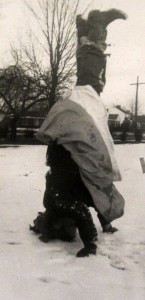My two-year-old granddaughter Emerald is in love with bubbles. Her fascination with them is her longest-running interest by far, and she never tires of our blowing them for her.
Every time she arrives at my house, without fail her first words are, “Oska bubbles? Oska bubbles?” We still aren’t sure what “oska” means, but when I pull the bubble-stuff from atop the ‘fridge, she begins jumping up and down and waving her arms with joy.
 Often she’ll run into a cloud of bubbles with an open mouth, getting bubble-soap on her tongue. “Tasty!” she’ll say, doing it again and again. (Surely she doesn’t know the definition of “tasty.”)
Often she’ll run into a cloud of bubbles with an open mouth, getting bubble-soap on her tongue. “Tasty!” she’ll say, doing it again and again. (Surely she doesn’t know the definition of “tasty.”)
Emerald likes to sit on the floor and let the bubbles float down to her, marveling when they pop in her lap. Or she’ll just poke them with her finger and shout, “Pop! Pop! Pop!”
She’s chased enough bubbles to have seen that each one includes a rainbow of colors, sometimes naming the ones she sees. She’s also learned to identify two bubbles stuck together. “Double bubble! Double bubble!”
Emerald faithfully points out bubbles she sees in unusual places, too, like in freshly poured coffee or milk, or in the wash machine, or even in the water coming from the kitchen faucet.
The trouble with bubbles, though, is how temporary they are. As they form and then drift along, they mesmerize us with their beauty, but with the slightest touch of a toddler’s finger, they’re gone.
Scripture talks about our lives being transient much like bubbles are. God doesn’t use the bubble analogy but does compare a life span to “a mist that appears for a little while and then vanishes.” In another place he notes we have “but a momentary” existence, and also says we “fade like leaves.” Each of us is “but a breath,” he says.*
Believing what God is trying to tell us in these word pictures should put us in right relationship with him, the Lord of eternity. He also hopes we’ll take comfort in remembering that when our struggles increase and life gets hard, it’s all short-lived compared to the joyful bliss he has in store for us.
 He may not say it directly, but when we look back on our earthly troubles, we’ll probably see them much like Emerald sees bubbles: Pop! Pop! Pop!
He may not say it directly, but when we look back on our earthly troubles, we’ll probably see them much like Emerald sees bubbles: Pop! Pop! Pop!
“O Lord…. Let me know how fleeting I am!” (Psalm 39:4)
*(James 4:14, Psalm 39:5 & 11, Isaiah 64:6)





